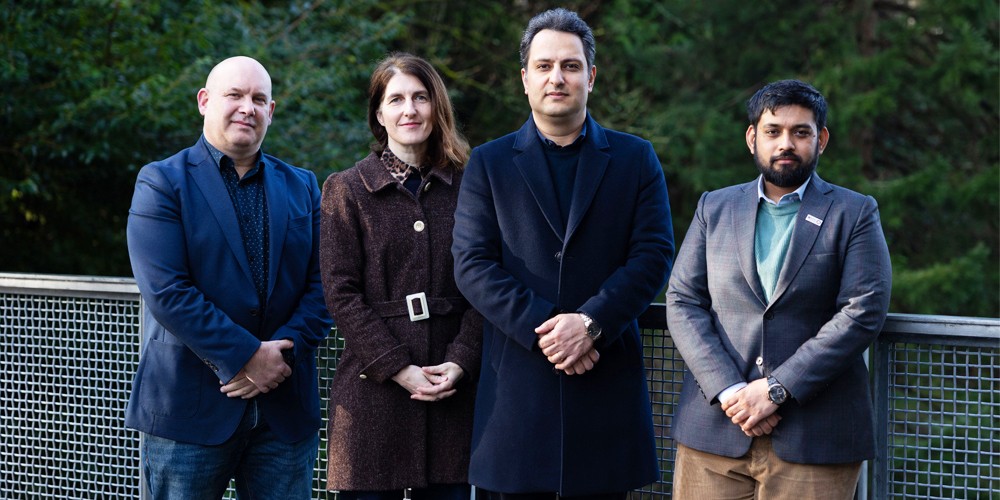
UCC researchers awarded €2.3m for new research to address climate and environmental challenges
Ireland must protect its transition towards net-zero emissions by 2050 from supply chain disruptions and geopolitical conflicts, according to a University College Cork (UCC) researcher leading a project on safeguarding Ireland’s energy transition.
Dr Vahid Aryanpur, of the School of Engineering and Architecture and the Energy Policy and Modelling Group at the MaREI Centre, Environmental Research Institute, made the comments as his project was announced as one of four UCC studies awarded a combined €2.3m in environmental research funding.
Dr Aryanpur, whose SHIELD project was today announced as a beneficiary in the latest Environmental Protection Agency (EPA) Research Call Awards said: “While switching to renewable energy reduces traditional risks such as the reliance on oil and gas, it introduces new risks around the high global demand of critical materials needed for batteries, wind turbines, solar panels, and electric vehicles. We must also ensure that the energy transition remains secure and affordable under rising geopolitical tensions around the world.”
SHIELD is one of four UCC projects to receive funding in the EPA Research Call Awards, to address a range of areas covering climate change, the natural environment, the green and circular economy, and the environment and human health.
The EPA Research Call provides support for innovative research projects that will support policy and decision making, while also addressing environmental, climate change and sustainability challenges.

Among the new UCC research projects to be funded by the EPA are:
Dr Niall Dunphy (School of Engineering and Architecture and the Environmental Research Institute)
Project Title: Understanding Irish people’s attitudes, beliefs and values related to climate change (CLIMATUDE) Funding amount: €658,181
CLIMATUDE will deploy a programme of engaged research to develop an in-depth understanding of Irish people’s attitudes, beliefs and values related to climate change. In realising this, the project will consider perceptions and attitudes to specific climate mitigation and adaptation measures, attitudes to wider governance structures and to decision-making processes. The project will map the knowledge and perceptions of Irish people relating to climate change and its societal implications. It will develop an in-depth understanding of how people’s attitudes to climate change are shaped by their sources of information, social networks and wider public discourse. It will explore how their beliefs and values are influenced by their socio-demographic attributes, especially gender, life-stage, socio-economic privilege, and educational attainment.
“The outcomes of the CLIMATUDE will feed into future research within the EPA’s climate change pillar and will inform ongoing activities within the National Dialogue on Climate Action and Local Authority Climate Action plans. Project outcomes will contribute towards the inclusion of climate justice principles in the design and implementation of climate actions. It will contribute to building public support and fostering accelerated movement towards a just transition,” said Dr Dunphy.
Vice President for Research and Innovation
University College Cork
Dr Archishman Bose (School of Engineering & Architecture) Project Title: Regenerative Value Systems for Irish Grown Wool in Ireland
Wool is a renewable biomaterial, opportune management and use of which can result in sustainable production of both food (such as sheep meat) and biomaterials (wool as bio-based textile/ packaging/ construction material). Ireland currently produces in the region of 7 million kilogrammes of wool from approximately 4 million sheep (35,000 flocks). Irish wool, typically characterised as ‘strong wool’ can have wide applications in textiles, packaging, environmental, and high-value materials. This project, by undertaking a comprehensive sustainability assessment of Irish grown wool, will provide data and evidence to inform Government policies, initiatives and investments required for regenerating the Irish grown wool industry for a sustainable circular bioeconomy. The outcome of this project will provide an essential building block that will enable wool to evolve from a waste farm product with negative return on investment, reestablishing the wool sector in Ireland in a sustainable and fit-for-purpose model benefiting all stakeholders along the value chain.
Dr Bose said: “This project, for the first-time, will undertake a comprehensive sustainability assessment of Irish grown wool including for the value created by local scouring in a cascading biorefinery on the island of Ireland. The project outcomes will also enable citizens and household consumers to make a more informed choice around sustainable biomass-based products allowing circular bio-based businesses to scale-up and flourish.”





